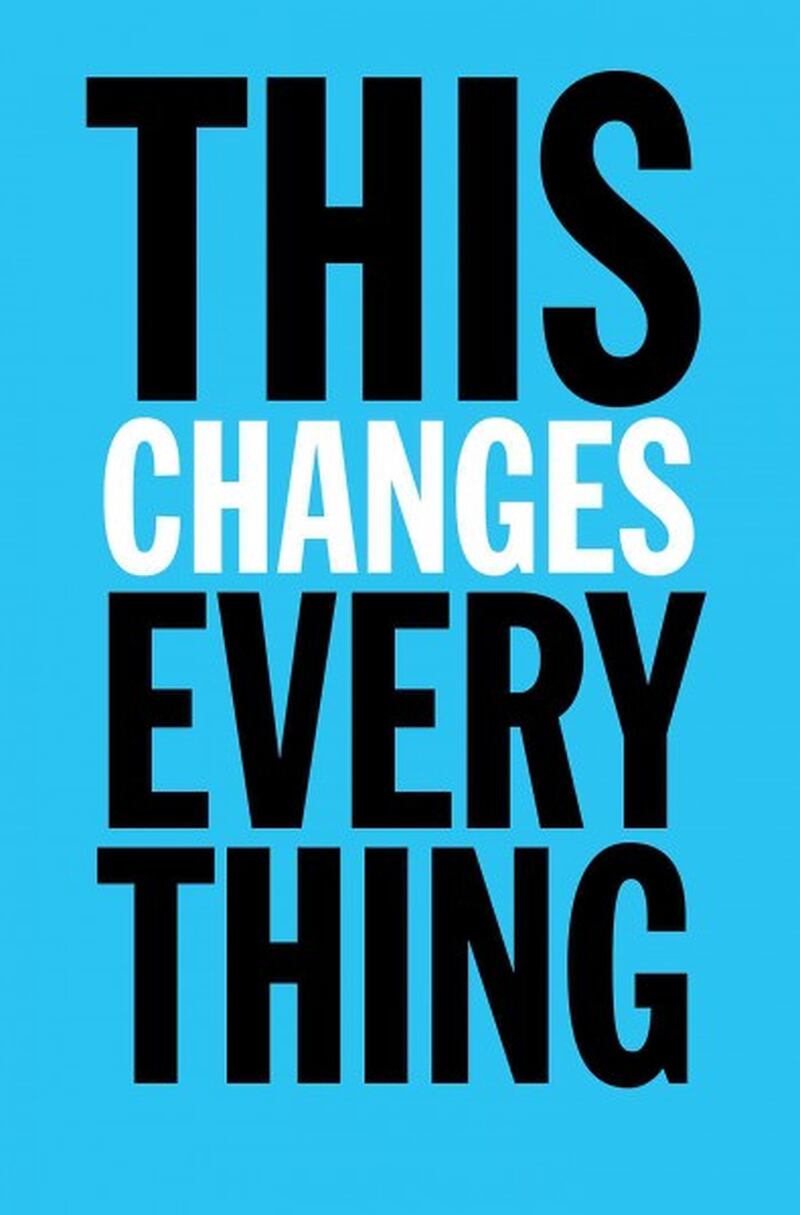Naomi Klein’s This Changes Everything recently dropped from No. 7 to No. 14 on The New York Times bestseller list. For most authors, just getting on any bestseller list would be a huge victory. But we’re talking about Naomi Klein, author of the bestsellers No Logo and The Shock Doctrine—so these rankings matter a lot more. Especially because she wants to change the world with this book.
The book is a manifesto—a single-handed attempt to galvanize the world to take to the streets. Citing the Harvard sociologist Theda Skocpol, Klein argues that the “major barrier to success” in climate change has been the “absence of a mass movement applying pressure from below.”
But while the book is a symphonic synthesis of ideas and polemic, of reportage and activism, and a bracing call to action, it is not only unlikely to spark a new global movement against carbon, but capitalism, too.
Manifestoes are often most powerful if the author plays a role in them, so this perhaps explains why Klein includes a problematic introductory section that frames the entire book as a Saul-to-Damascus story of her own coming to grips with climate change. In her telling, she was, until just five years ago, a complete naif about climate change. “I denied climate change for longer than I care to admit,” she writes. “I told myself that the science was too complicated and that the environmentalists were dealing with it.” She then takes us into her realization that not only carbon but capitalism must be destroyed, a story that she weaves in with her fertility battles and the birth of her son.
While this is a compelling story, it also creates the paradoxical effect of making this perspicacious and successful author seem like an idiot. She writes as if Al Gore never wrote Earth in the Balance in 1992, which raised the loudest possible alarms about carbon and climate change (see the title) and which was a national bestseller and dialogue-changer. She is, in fact, strangely dismissive of Gore, noting tartly that in the Clinton administration he was “largely responsible for getting so many Big Green groups on board” NAFTA and WTO fights. (“Big Green” is not, for her, a term of praise.)
Well, now that she believes in climate change, her thesis is that it offers a silver lining, an opportunity to replace “deregulated capitalism, the reigning ideology for the entire period we have been struggling to find a way out of this crisis. Climate change, she writes, can be the “force—the grand push”—to bring together movements for human rights and equality, for real decolonization and reparation, for food security and farmers’ rights, and for expanding the public sphere.
Along these lines, she dedicates a large section of the book to “Blockadia”—the new international protest movement, often by indigenous peoples, aimed at extractive fossil-fuel projects (one U.S. example is the fight over the Keystone XL pipeline).
The book rejects capitalism, market mechanisms, and even, seemingly, profit motives and corporate governance. Klein is harshly dismissive of the cap-and-trade legislation that came exquisitely close to passing Congress in 2010, alleging that it just would have rewarded the same corporate actors she lambastes in the first place. But it is implausible at best to suggest that nothing is better than something.
The book is strongest on its reportage. She is groundbreaking on the problem of methane leaks in natural-gas fracking, an exception that swallows the rule. She uncovers deep problems in the quest for technological solutions to overheating, such as spraying massive amounts of reflective chemicals into the air (which she calls “magical thinking.”)

She roughs up entrepreneur Richard Branson for breaking a pledge to spend $3 billion over a decade on developing biofuels (“It’s just that the Virgin Group decided to follow the basic imperative of capital: Grow or die.”)
And she convincingly blames the “invisible confinement” of deregulatory ideology for preventing President Obama from being able to put the stimulus package of 2009 toward transformative, lower-carbon infrastructure and programs.
Her new paradigm leads her to carve up shibboleths and heroes alike. She skewers the Nature Conservancy for sponsoring oil drilling on their property for profit. She attacks the modern Environmental Defense Fund for embracing markets and corporate partners. Throughout, she’s consistent in identifying as her signal enemy the “pro-corporate groupthink... that holds that private, market-based solutions are inherently superior to simple regulatory ones.”
But that ambition can undermine her reporting. Some of her calls for activism read as warmed-over tracts from decades ago. “[W]hat we can do,” she argues, “what doesn’t require a technological and infrastructural revolution—is to consume less, right away.” But Jimmy Carter was calling for Americans to reduce consumption in the 1970s. If anything, we now know that it’s precisely technological and infrastructural innovation, including insights into behavior psychology that motivate reductions in energy use.
Her analysis also occasionally becomes incredibly simplistic, such as when she claims that in the first decade of the new millennium, “climate talk was a strikingly elite affair,” and there were “no angry leaders (other than a former vice president of the United States).” Nobody in leadership positions was angry about climate change in the 2000s other than Al Gore?
She concludes the book on an intentionally provocative note, likening the dependence of the modern global economy on fossil fuels to the early 19th-century U.S. economy’s dependence on slave labor. She argues that just as abolitionists’ rhetoric became “even starker and more uncompromising” over time, so climate change should adopt its “full moral voice” through “fiery, highly polarizing rhetoric.”
But that leads to the key problem. Klein is simultaneously not only cynical about political leaders, but dismissive of them. She derisively writes, “[T]he only thing politicians fear more than losing donations is losing elections.”
The book reads like a go-get-‘em to the radically decentralized Occupy movement—no politicians there—but it’s also haunted by Occupy’s failure to achieve much of any real change, especially on public policy. Klein writes, “As many are coming to realize, the fetish for structurelessness, the rebellion against any kind of institutionalization, is not a luxury today’s transformative movements can afford.” But Klein offers nothing specific to replace that structurelessness.
As Ira Shapiro conclusively showed in his recent book The Last Great Senate, leadership matters a great deal to achieving regulatory victories—such as the series of environmental statutes (the Clean Air Act, Superfund) that Klein paradoxically praises.
That has only been reinforced with President Barack Obama’s recent announcement with Chinese President Xi Jinping of a pact to cut carbon omissions. Leadership still matters—a lot.
Klein’s book promises to change everything. But for anyone who believes in capitalism and political leadership, her book won’t change anything at all.






